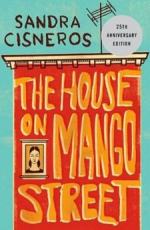|
|
The House on Mango Street Author/Context
Sandra Cisneros (1954-present)
Born in Chicago on December 20, 1954, Sandra Cisneros is the only girl in a family of seven children. Her Mexican father and Chicano mother constantly moved around from neighborhood to neighborhood, leaving Cisneros with the mixed sense of strong family ties and scattered home - themes which appear in her writing. The family's perpetual visits to Mexico gave Cisneros a center and sense of Hispanic heritage. She attended Loyola University of Chicago in the mid-seventies, graduating in 1976 with a Bachelor's Degree in English, which she soon followed up with an MFA from the acclaimed Iowa Writer's Workshop in 1978. It is from these educational experiences that Cisneros realizes that her writing is different from the 'typical' American. She uses her own experiences as an outsider, not only by race and culture, but also by gender, to create a unique voice in American literature.
Cisneros's work crosses genres, falling into the various categories of fiction, poetry, and memoir. Her first and most noted work, The House on Mango Street is a combination of various vignettes together creating a novella. Some see it as poetic prose, while others view it as a new canon in literature. "Though not commonly accepted by critics as "canonical", The House on Mango Street belongs to the entire tradition of the bildungsroman (novel of growth) or the kunstlerroman (novel inimical to growth), especially as these patterns apply to women" (Matchi 67). The House on Mango Street was published in 1984 and soon won a selection of prestigious awards, such as the Columbus Foundation's American Book Award in 1985, which led to fellowships and grants from the National Endowment for the Arts and teaching/lecturing positions across the country. During this time of discovery, Cisneros divided her time between California and Texas, constantly returning to her roots in Chicago.
Cisneros has written a substantial amount of material, all garnering significant praise and respect. Her first book of poetry, My Wicked, Wicked Ways was published in 1987, followed by a book of short stories, Woman Hollering Creek, published in 1991, and Loose Woman in 1994. It was this final collection of short fiction that guaranteed Cisneros a place amongst the American Writers of the 20th century, winning the PEN Center West Award for Best Fiction, Quality Paperback Book Club New Voices Award, Anisfield-Wolf Book Award, and the Lannan Foundation Literary Award. Cisneros's work has been highlighted and lauded by The New York Times and American Library Journal.
Cisneros continues to write and currently lectures at youth centers, community colleges, and universities around the country, just like her central character Esperanza vows to do in The House on Mango Street. The character of Esperanza in The House on Mango Street has been compared to such literary icons of Americana as Huckleberry Finn. "It may seem that the two boy's books are really journeys, while Mango Street is limited to a house, and therefore set - the opposite of a geographical quest. But when one looks at the patterns of the novels, what the boys go out to see simply comes past Esperanza, so that the effect is the same" (Matchi 66).
Bibliography
Cisneros, Sandra. The House on Mango Street. Vintage Books: New York, 1984.
Matchi, Thomas. "Literary Continuity in Sandra Cisneros's 'The House on Mango Street.'" The Midwest Quarterly. Autumn: 1995, pp. 67-80.
Sandra Cisneros: Biographical Note. 8 July, 2002.




